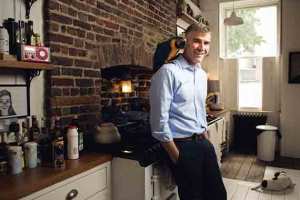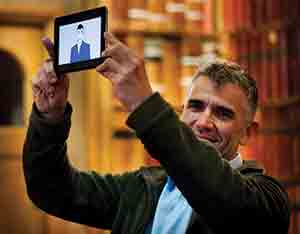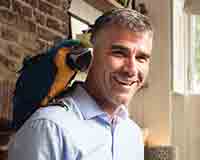 Stepping into Ivan Massow’s kitchen is like falling head first into Russell Square’s own not-so-little Narnia.
Stepping into Ivan Massow’s kitchen is like falling head first into Russell Square’s own not-so-little Narnia.
And this is not just a rare example of one of those tiny townhouse front doors opening up into a beautiful mansion-style property on a bustling street in the heart of urban London. It goes several steps beyond that.
Because while the country-house décor complete with a vast island unit and Aga range is pretty incongruous with the UK capital’s midtown business district, it is the parrot perch in the bay window, the giant wooden horse sculpture on the table and the photos of Joan Collins on the fridge doors that make walking into Massow’s world so surreal.
That and all the animals. Two blue and yellow macaw parrots, Elizabeth and Romeo, squawk and flap across the room – a distraction that at least explains the presence of the perch. At ground level, Massow’s dogs Jasper and Taxi leap about underfoot as Twinkles the cat takes one look at the increasingly high-octane excitement mounting in the room before launching herself out of the door and into the garden like a shot.
“Hi,” comes a familiar voice through the chaos. “Coffee?”
Welcome to Massow HQ. The central London hub, and home, of the Conservative London mayoral candidate who, six months ago, was pretty much unheard of outside Westminster. Then, last month, he launched his campaign video and everything changed.
Here the man who introduced himself to the world as a gay, ex-alcoholic, dyslexic, adopted activist and businessman explains why he would fight for developers and champion overseas investment if he was to become London’s next mayor. And clarifies why he believes Tory values are more LGBT-friendly than many might think.

Cartoon show
The campaign video, for anyone who has not seen it, or is at least aware of its existence, was carefully planned to give it the best chance to go viral. It promptly did – in part due to the stark, honest content and, says Massow, because of the decision for him to appear in it only as a cartoon. Something totally different.
“It is quite funny,” says the 47-year-old, known for making his millions as a business entrepreneur, launching his first company in 1990 from a squat in Kentish Town offering financial services to gay people. “People still don’t really know what I look like because we did it as a cartoon. But it has had millions of views which is what we wanted. I traded in my face to do something that would mean more people know what I stand for.”
And this, he says, is one of the only reasons he finds the extensive coverage of his private life difficult – he is known in the press for his celebrity connections – when it dilutes what he wants to achieve as he stands for office: “It doesn’t bother me that my past and private life are written about so much. I was an alcoholic. And, rather glamorously, it was Joan Collins who told me I needed to sort myself out. But it does frustrate me that what I have to say now is so rich and thick with policy and people can’t get past all that other stuff to see it. I declared I would be running around eight months before anyone else so I could visit every kind of institution in London, from the air ambulance to planning offices and from children’s hospices to housing associations. I have written policy essays on every single thing you can think of. But it is hard to talk about policy when everyone is distracted by Joan Collins.”
So what better place to start than his political vision for London?
City is good for city
“London is a Labour-dominated city,” he says. “And views on the City, financial services, property developers and overseas investment have been very negative up until now. I stand for completely the opposite. I see all these things as a major asset and I would be devastated if we lost any one of those.
“When I am sitting in hustings David Lammy and George Galloway will gesticulate in the vague direction of the Thames arguing that all property is being bought by foreign investors who will leave them empty and so we shouldn’t allow overseas investors into the UK. This is ridiculous.”
Massow says that in a city where two-thirds of the Fortune 500 companies are based outside of the UK and where the evidence suggests that overseas buyers are investing in properties to rent out, there are simple solutions to tackle empty properties without a blanket ban or cap on foreign investment: “You can introduce an empty [residential] properties tax. Small, central steps that can be taken to deal with public concern. I do not think there should be any cap or limit on overseas investment in London. We need as much as possible. I hear people say, ‘there is a new development, but isn’t it terrible it is all Malaysian money?’ No. I don’t care who writes the cheque to get these things built.”
Massow also advocates an automatic call-in on developments that are held up in planning to take the onus off of developers and councils to make the decision themselves: “Developers are often too scared to use the call-in right as they do not want to blot their relationship with the council. I think if it was taken out of both their hands and simply went directly for review after a certain period then everyone would appreciate it. Quite often these hold-ups are down to simple issues and just getting everyone in the room together is all it might take to sort it out.”
As for developers only building homes for the rich, Massow is quick to dismiss this as “left-wing scapegoating” arguing that a few glass houses for oligarchs and captains of industry does not prevent new, affordable developments from going up in London’s fringe areas. He does appreciate that more must be done and says it will be a tough gig for whoever ends up as the successful candidate.
“People can pretend all they want that everyone was talking about housing when the last mayor took on the role. But they weren’t. They were talking about bendy buses. Housing is a major issue now and I want to increase the number of people who opt out of section 106s and instead write a cheque based on value of the property because I think we can do more with money. If you had a third of the value of an estate you could build so many more social housing units or affordable homes than we can under the current planning system.”
Beacon of hope
From property to LGBT issues and Massow says that if he does become London’s first out gay mayor, then maintaining London’s position as a global powerhouse will be the best thing he can do for equality – not just in the UK capital but across the globe. “London is a beacon of hope around the world to people who are suffering human rights abuses. From women not being able to drive in Saudi Arabia, to people not being allowed to use the internet freely in China and those being put to death because of their sexuality in certain Middle Eastern and African countries.
“This city can play such an influential and persuasive role in helping to stop this because we are one of the most powerful and financially strong cities in the world which is, in part, down to the fact that London is so wonderfully diverse.”
And Massow has famously, and pretty controversially, shot down anyone who would argue that Conservative values and LGBT rights do not go hand in hand. And he is always quick to make clear he does not come from what many might consider a traditional Tory background: “I am not a career politician who was born into politics. Or wealth. Or Eton,” he says. “I am a Tory because I believe in low taxation, a regulated free market and a small state. I loved the meritocratic nature of Thatcherism when I was growing up poor and, in my case, fostered and adopted. So I was a Conservative but that was tricky because Conservatives appeared not to like gay people very much, to put it bluntly. And so, if sexuality is someone’s principle concern, and they don’t think too much about economics and growth I think they would often simply badge themselves up as socialists as they felt this side of the political spectrum was more sympathetic to their sexuality. But if you give someone a multiple-choice test about the way they live their lives – they may find themselves falling into the Conservative side without actually realising. So I set out to try to move the party to the centre on these issues. And to make the party more relevant.”
And has he succeeded? “I think so. It was revealed recently that LGBTory is bigger than all other parties’ LGBT communities combined and we have more gay MPs than all the other parties put together too.”
As for diversity and discrimination across the board – whether it be in politics, business or just walking down the street, Massow is entirely unfazed when it comes to his own personal experiences. He says that while there is a long way to go, a lot of it has to do with individual reactions: “You just wouldn’t take someone seriously now if they were racist, sexist or anti-gay. You would consider them a pastiche of a human being. But not a real person. Someone who is going to be successful in this world needs a contemporary moral compass and so I don’t worry about people who don’t.
“But then I have personally never felt discriminated against. Even in the dark old days. And I think it is because I am just not that type of person. And actually everyone, whoever they are and whatever they stand for is likely to feel discriminated against at some point by someone in their lives. Even Etonians.”
View Ivan Massow’s campaign video here
Massow on…
• Zac Goldsmith: “He looks incredibly strong through the gate. But when Sadiq Khan declared, everyone said no one else should even bother and now he is looking very soft indeed. Everything is still to play for and I now see myself in a very credible position.”
• London museums: “I would have them open all night for one night a month, or even a week, if I become mayor to give Londoners a chance to actually see them rather than travel past on their way to and from work.”
• Smiling: “The last time I was in the public eye was back in the 1990s and I was often described as arrogant. But I think it was because I was shy so I avoided eye contact. I have learnt how to smile indiscriminately now. Because you are at work all the time when you are running for office like this. I have learnt to look happy even when I have just had a fight with my mum.”
For more on Estates Gazette’s LGBT Special Edition click here.











